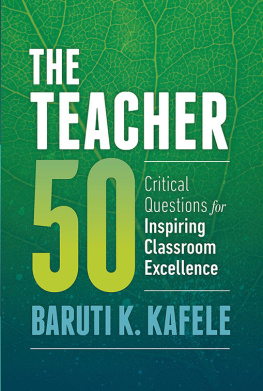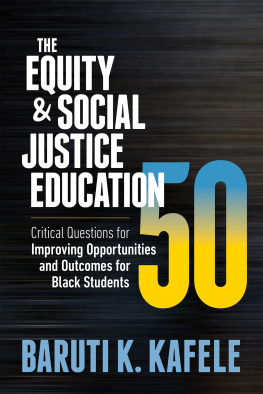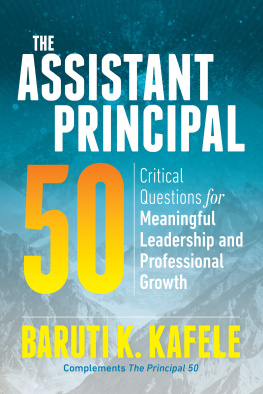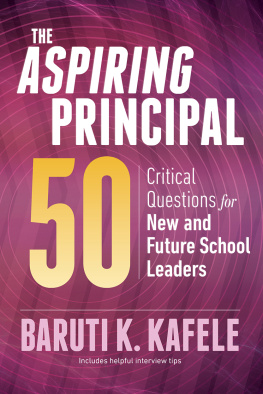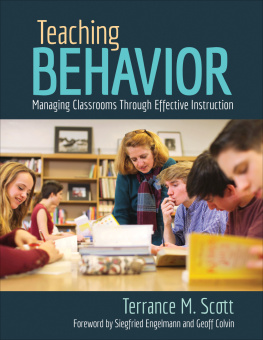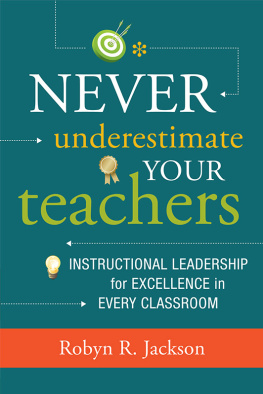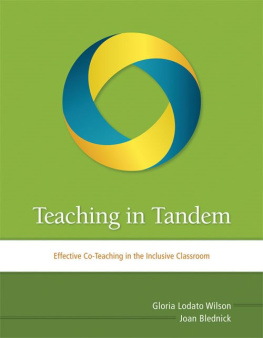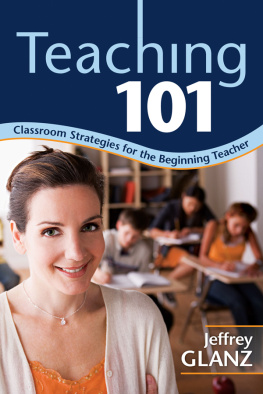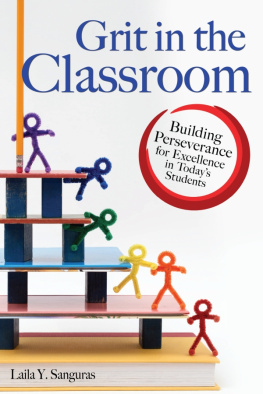Other ASCD books by Baruti K. Kafele
The Principal 50: Critical Leadership Questions for Inspiring Schoolwide Excellence
Closing the Attitude Gap: How to Fire Up Your Students to Strive for Success
Motivating Black Males to Achieve in School and in Life
....................
To the teachers who read this book: In thisage of criticizing, blaming, scrutinizing, andbashing teachers, I want to remind you all thatYOU make the difference in students lives.Your students will soar as high as you takethem. Stay encouraged and stay inspired.YOU MATTER!
Introduction
....................
Ever since I entered the ranks of teaching in 1988 as a 5th grade teacher in Brooklyn, New York, the word dream has been a major part of my lexicon. For years, I would tell my students that they must dare to dream and they must dream big. This made perfectly good sense to me. After all, how can we expect youngsters to strive for excellence if they don't have a dream of excellence first? In addition to dreaming, I liked to encourage students to imagineto imagine excellence, to imagine greatness, to imagine doing extraordinary things with the education they are receiving.
Several years into my teaching career, it occurred to me that my encouragements were probably falling on deaf ears. I concluded that I was speaking to students in a language that they didn't understand. The overwhelming majority of my students had grown up in economically disadvantaged communities where opportunities for success were grossly limited. How could they dream of or imagine a successful life when poverty was all around them?
When my students did dare to dream big, their dreams were almost always confined to the worlds of sports and music. Year after year I would survey my students, and year after year the overwhelming majority of them aspired to become superstar athletes or entertainers because these were the only successful types of people they saw in the media who "looked just like them." In their minds, sports and entertainment were the only ways out of lives of grinding povertybut the likelihood that they had the talents and predispositions necessary to make it in those highly competitive fields was always going to be slim. If they didn't become professional athletes or entertainers, what kind of alternatives did they have? And how could I inspire them to work toward classroom excellence regardless?
The challenges I faced trying to inspire my students to dream big despite their circumstances was my motivation for writing The Teacher 50: Critical Questions for Inspiring Classroom Excellence. I want you to reflect upon your teaching practices and the overall learning environment you have created: How have these elements succeeded or failed to inspire your students?
The Teacher 50 complements my previous book, The Principal 50. It is intentionally short out of respect for classroom teachers' extremely busy schedules. The 50 reflective questions in this book are offshoots of one essential, overarching query: How can I inspire excellence in my classroom? This is the fundamental question that I want you to keep in the back of your mind at all times. After you've read The Teacher 50 for the first time, I encourage you to regularly ask yourself the 50 questions as they relate to your daily practice. Remember: The more inspired your classroom, the greater the chances that your students will achieve excellence.
Chapter 1
Teacher Attitude
....................
Q: Are My Students at an Advantage Because I Am Their Teacher?
An ongoing debate in the world of education revolves around the question of who or what has the biggest influence on a child's potential for classroom success. Some argue that students' home environments make the biggest difference; others argue for students' socioeconomic status, the overall school environment, or the classroom teacher. I contend that all these variables have a significant influence on studentsbut none more so than students' teachers.
The amount of influence that classroom teachers have on student success can't be overstated. They are the ultimate difference-makersthe game-changers who can either make or break their students. It's pivotal to understand this influence. When you walk into your classroom every day, confident that you are the number-one determinant of the success or failure of your students, you are ready to ensure that optimal student learning will occur. When you take it a step further and internalize the idea that your students will be successful because you are their teacher, your students are in the best possible position to achieve success. I'm not promoting egotism hereI'm promoting the willful, inspiring attitude necessary for your students to experience classroom excellence.
Q: Why Do I Teach, Anyway?
One day, it occurred to me that every single word in the dictionary has a meaningor, you might say, a purpose. And as with words in the dictionary, all teachers should also be able to define the purpose of their work. Teachers who come to class every day with no purpose are like words in the dictionary with a blank space where the definitions should be.
What is your definition of your work's meaning and purpose? Go beyond generalizations like making a difference in the lives of children or preparing them for the future. What is your specific purpose for teaching your students? What drives you to get up in the morning and report to your classroom every day? What drives you to continue to do the work that you do despite the challenges that you face every day?
When I worked as a classroom teacher I was driven by many different factors, but at my core, my ultimate purpose was to motivate, educate, and empower childrenwith an emphasis on empower. To empower children is to make them stronger, more confident, and better able to control their lives (and to turn the corner if they're on the wrong track). Far too many students, particularly those from disadvantaged backgrounds, don't feel empowered to take charge of the direction of their lives.
Now think about your specific purpose for the work that you doyour personal definition of teaching. Let this purpose drive everything that you say and do from now on as you work to inspire classroom excellence.
Q: How Badly Do I Want to See My Students Succeed?
When I conduct professional development workshops with educators, I typically begin by asking attendees, "What are the challenges, obstacles, pressures, demands, and adversities that you face in your classrooms daily? Put another way: What keeps you up at night?" The teachers' responses can sometimes be overwhelmingly emotional. I recall several times having to hold back tears as I listened to teachers with tears in their own eyes. At one workshop not too long ago, a teacher confided to me that what kept her up at night was knowing that one of her students lived in a rat-infested apartment. She told me that this knowledge made her particularly determined to ensure that her student would become a success. These moments speak volumes to me: They are glimpses into the hearts of teachers who take the pressures and demands of their jobs home and to bed every evening.
My point in asking teachers to share during workshops is to gauge how badly they want to see their students succeed in the face of sometimes overwhelming odds. How badly do

